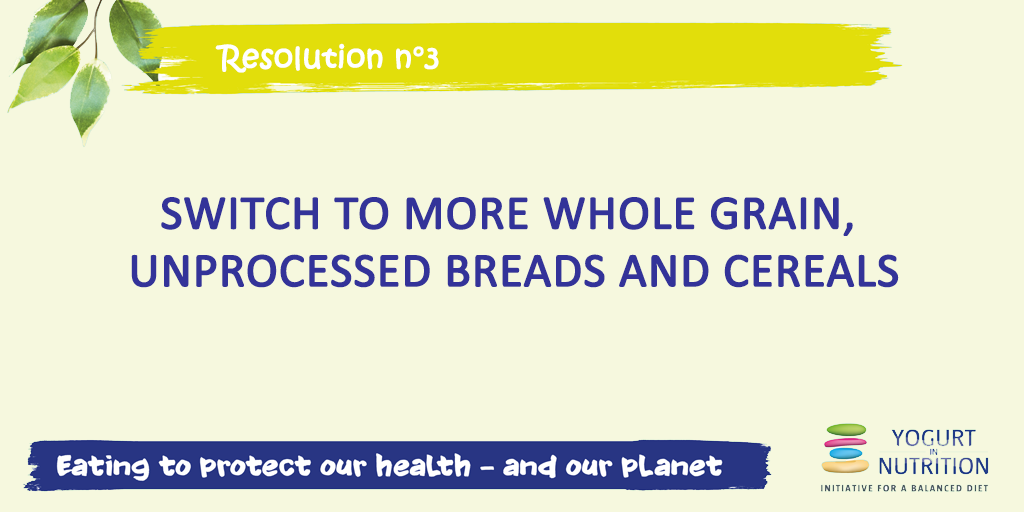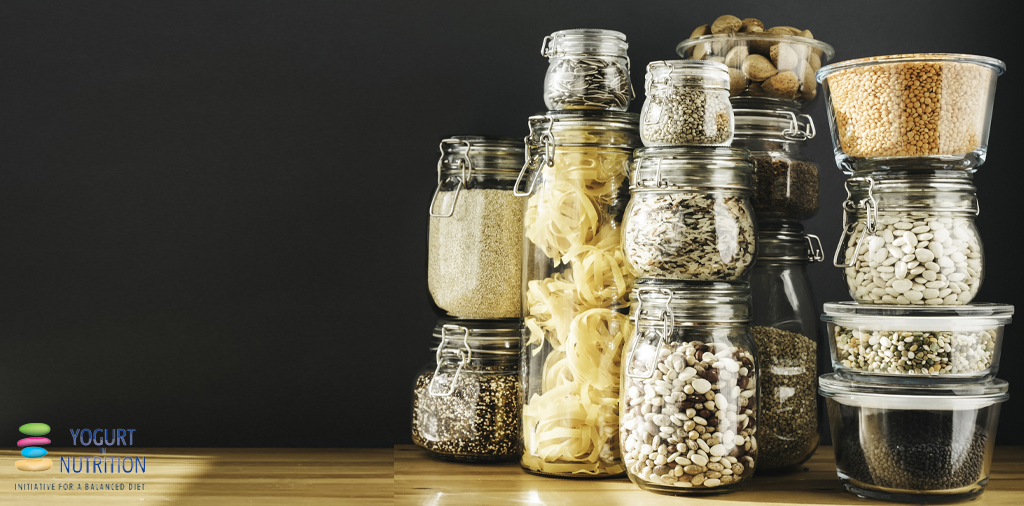At the Yogurt In Nutrition Initiative, we look forward to a more sustainable 2020 and we bring you 12 food resolutions to protect our health and our planet! This month’s resolution: add more whole-grain foods to your diet.

Add more whole grain, unprocessed breads and cereals to your diet
In order to adopt a more sustainable lifestyle, you might adapt your diet to what is best for the planet and your health. By switching to a whole-grain diet, you’re choosing a tasty diet while contributing to a positive effect on the environment.
Indeed, for a more sustainable and healthy diets, the international guidelines (FAO &WHO 2019 guiding principles) recommend including whole-grain in your daily diet.
Replacing foods made from refined flours with unprocessed flours, whole-grain cereals and legumes helps to stay healthy. Whole-grain are nutrient-rich and contains fiber and micronutrients like magnesium. This essential micronutrient plays a pivotal role in biological processes. It has been shown that high dietary intake of magnesium is associated with a decreased risk of type 2 diabetes, (T2D), hypertension, and metabolic diseases, as well as against total cardiovascular diseases (CVDs) and stroke.
Transforming your eating habits is easier than you might think: you can simply replace white rice and pasta with whole-grain ones; add quinoa to your salads and muesli to your breakfast.
For a better diet quality, you can consume more whole-grain products at breakfast time. For example, try making healthy and tasty breakfast bowls with:
- Plain yogurt as a nutrient-dense matrix. It provides high quality proteins, calcium, vitamins, and live bacteria, which makes it easy to digest.
- Colorful pieces of fruit for fiber and more nutrients. Select fruits according to your taste. They are rich in fiber, antioxidants and vitamins.
- Whole-grain cereal! It contains magnesium, vitamin B and fiber (brain) as well as complex carbohydrates that provide steady energy.
- Nuts and seeds make a tasty and crunchy topping. They are full of antioxidants, Omega 3, fiber and protein.
A healthy and tasty breakfast bowl is a great way to start your day with a tasty, nourishing and nutritious meal! A well-balanced breakfast is high in fiber from wholegrain cereal, fruit, nuts and seeds… Eating fiber may protect against heart diseases, promote weight issues and have positive effects on gut microbiota.
For more information, check out our Q&A about sustainable diets and our reports on healthy diet:
- https://www.yogurtinnutrition.com/what-is-a-flexitarian-diet/
- https://www.yogurtinnutrition.com/kick-start-your-day-with-a-healthy-breakfast-associated-with-weight-control/
- https://www.yogurtinnutrition.com/magnesium-found-yogurt-may-help-protect-cardiovascular-diseases-risk/
Sources:
-
Willett W, Rockström J, Loken B, et al. EAT-Lancet Commission Summary report: Food in the anthropocene: the EAT– Lancet Commission on healthy diets from sustainable food systems. Lancet. 2019;393 (10170):447-492.
-
WWF (UK). Eating for two degrees. 2017.
-
Rosique-Esteban N, Guasch-Ferré M, Hernández-Alonso P, Salas-Salvadó J. Dietary magnesium and cardiovascular disease: a review with emphasis in epidemiological studies. 2018 Feb 1;10(2). pii: E168.
-
FAO & WHO. Sustainable healthy diets guidelines principles. 2019.



